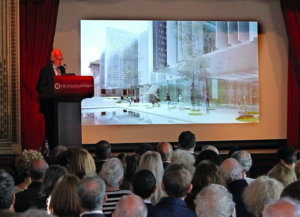NEWS New York Celebrates the Soon-To-Be-Inaugurated Museum of Italian Judaism and the Shoah
“The Italian Government invested important resources in the Museum of Italian Judaism and the Shoah, and now we want to make sure to raise enough funds to guarantee its development. Anybody who is interested in supporting us here in the United States, should know that their contribution will be essential for keeping the rich and ancient Italian Jewish heritage alive, and for promoting its knowledge”. With these words, the Italian Minister for Cultural Heritage Dario Franceschini presented the Museum of Italian Judaism and the Shoah (MEIS) last week in New York.
Franceschini took part in the event “World Cultural Conservation. Italy at the Forefront” at the Italian Academy for Advanced Studies in America of Columbia University, conversing with its director, historian David Freedberg.
The MEIS will be inaugurated on December 13 in Ferrara “a city that has been full of Jewish culture for over a millennium, and has played a protagonist role in Italian Jewish history,” highlighted Dario Disegni, the president of the MEIS.
Attending the event in New York were among others, MEIS director Simonetta Della Seta, the Italian Ambassador, Armando Varricchio, the general consul in New York Francesco Gianuardi, and the director of the Italian Cultural Institute Giorgio Van Straten.
Italy leads globally in cultural preservation efforts, says Italian minister
NEW YORK—Italian minister of cultural heritage and tourism Dario Franceschini spoke at Columbia University on Thursday, discussing the role of Italy as a global leader in preservation of cultural heritage and its efforts to prevent illicit trafficking of cultural property.
Franceschini, 59, is a member of the Democratic Party and has been the minister of cultural heritage since 2014. At Columbia’s Italian Academy, he spoke about several topics related to Italy, including the country’s growing economy, internationalism, and the drastic changes that museums and cultural institutions are currently undergoing. He also mentioned the importance of protecting cultural heritage from “terrorists”—referring to ISIS—and stressed the importance of UNESCO’s resolutions against trafficking. (He did not mention the decision of the United States to withdraw from UNESCO, which was announced just one week earlier.)
“Italy doesn’t have one big national museum, like the Louvre in France,” said Franceschini. “We have more than 4000 museums, 400 of which are owned by the State.” In Italy, he joked, “you never know if you are standing inside or outside of a museum.”
While the country has gained a reputation for its efforts towards preserving cultural heritage—both at home and abroad—it’s still “backwards” with regards to the enhancement of its own heritage, said the minister. Few museums, for instance, have restaurants or spaces designed for children.
Over the last few years, the Italian government started a process to grant autonomy to 20 of its public museums. The reform included international competitions for aspiring museum directors (the competition for Rome’s Colosseum is still open). Franceschini said he has been strongly criticized for opening them to foreign applicants. “These controversies show the backwardness that is there,” he said. “There are also many Italians who move to curate museums abroad. The director of [London’s] National Gallery is Italian.”
The minister said he encourages young Italians to pursue experiences abroad—as long as he can also attract foreign youth to Italy. “The youth is often ahead of the government,” he said. “We need to build bridges, not walls.”
At the end of the talk, Franceschini invited Dario Disegni, president of the National Museum of Italian Judaism and the Shoah (MEIS), to introduce the project for the museum, which is opening in the city of Ferrara in December. Disegni said the museum will be a place for “research, education and dialogue … a place of inclusion.” Over the next weeks, he said, they will begin the preparations for the first exhibition of the museum, entitled “Jews, an Italian history. The first 1,000 years.”
The MEIS, which is being built in a former prison, will have a library, an archive, an auditorium, a restaurant and a cafeteria, said Disegni, echoing Franceschini’s remarks on the future of Italian museums.
Simone Somekh, New York Transatlantic, October 20, 2017

